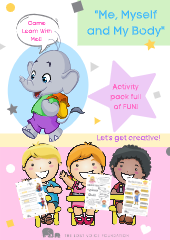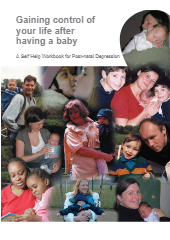The Unforgettable Adventures of Grandma’s Cape: A Children’s Activity Book on Dementia
The Unforgettable Adventures of Grandma’s Cape is a heartwarming activity book designed to help children understand dementia and the changes it brings to their loved ones. Through an engaging story, fun activities, and “Memory Minute” educational facts, the book reassures children that even when a grandparent forgets things, they can still share love, joy, and meaningful moments together.
With colouring pages, puzzles, and storytelling prompts, this book encourages kids to stay connected with their grandparents and learn how to support them. A valuable resource for families navigating Alzheimer’s or other memory-related conditions.

What’s Happening to Grandpa? A Family’s Journey with Alzheimer’s
What’s Happening to Grandpa? is a fotonovela that follows a Latino family as they navigate the challenges of Alzheimer’s disease. Through a relatable story, it illustrates the early warning signs, the emotional impact on loved ones, and practical steps for seeking medical and emotional support. The booklet provides clear guidance on recognising symptoms, managing daily care, and accessing resources like the Alzheimer’s Association Safe Return® program.
This resource is designed to help families understand Alzheimer’s and support their loved ones while maintaining their well-being. It encourages open conversations and offers useful strategies for coping with the changes the disease brings.

The Mind Thief: A Kid’s Guide to Alzheimer’s Disease
The Mind Thief is a graphic novel designed to help children understand Alzheimer’s disease through storytelling. The book introduces the concept of memory loss in an engaging and accessible way.
Inspired by Indigenous wisdom and modern science, the story guides young readers through the challenges faced by families when a loved one is diagnosed with Alzheimer’s. It encourages empathy, patience, and understanding while providing insights into the emotional and practical aspects of caregiving. A valuable resource for children, families, and educators looking to explain Alzheimer’s in a compassionate and relatable manner.
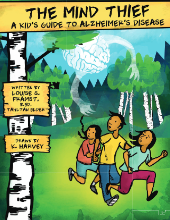
Memories with Grandma: A Dementia Awareness Activity for Kids
Memories with Grandma is an engaging activity pack designed for children aged 5–11 to help them understand dementia in a simple and relatable way. Through an animated story and interactive activities, children learn how dementia affects memory and daily tasks while exploring ways to support and connect with loved ones living with the condition.
The resource includes creative worksheets, storyboards, and discussions that teach key dementia-friendly messages, emphasising that people with dementia are still the same loved ones at heart. It encourages kindness, patience, and awareness, making it a great tool for schools, families, and youth groups to foster a more dementia-friendly generation.
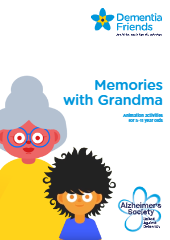
Memories with Grandma Elf: A Dementia Awareness Activity for Kids
Memories with Grandma Elf is an engaging educational resource designed for children aged 5–11 to help them understand dementia through storytelling and interactive activities. The story follows Mo and his Grandma Elf, who is living with dementia, as he learns about her condition and how to support her.
Through animation, worksheets, and creative exercises, children explore how dementia affects memory, emotions, and daily life while learning ways to help, such as being patient, kind, and supportive. The activity also introduces the concept of “Elf-less acts”, encouraging kids to take small, thoughtful actions to create a more dementia-friendly community.

The Milk’s in the Oven: A Booklet About Dementia for Children and Young People
The Milk’s in the Oven is a supportive and informative booklet designed to help children and teenagers understand dementia. Through real-life experiences and expert insights, it explains how dementia affects memory, thinking, and daily life. The booklet addresses common challenges, such as confusion, forgetfulness, and changes in behaviour, while offering guidance on how young people can support their loved ones. It also explores the emotional impact on families and provides practical activities to help children develop empathy and understanding. A valuable resource for schools, families, and caregivers, it encourages open conversations and fosters a dementia-friendly mindset.

What My Grandma Means to Say: A Discussion Guide on Alzheimer’s
What My Grandma Means to Say is a one-act play designed to help children understand Alzheimer’s disease and its impact on families. This discussion guide provides educators, parents, and caregivers with structured ways to start conversations about dementia. It includes kick-off questions, FAQs, suggested activities, and book recommendations to help young people process the changes they may see in loved ones. The guide encourages empathy, understanding, and ways children can offer support while navigating their own emotions. Ideal for schools, community groups, and families looking to create a dementia-friendly environment through open and supportive discussions.

Just for Kids: Helping Children Understand Dementia
Just for Kids is an engaging educational resource from the Alzheimer Society of Canada designed to help children understand Alzheimer’s disease and other dementias. It explains how dementia affects memory, thinking, and emotions, using simple language and interactive activities. Children will learn why their loved ones may forget names, repeat things, or get confused, while also discovering ways to help, such as creating a Memory Box, looking at old pictures, or helping with small tasks around the house.
This resource encourages empathy and provides reassurance that even when someone with dementia changes, they still feel love and connection. Perfect for families, schools, and community groups looking to support children through a loved one’s dementia journey.

Helping Children Understand Dementia: A Guide for Families
This resource provides guidance on how to talk to kids about Alzheimer’s disease and other dementias in an open and supportive way. It offers practical advice on explaining dementia in an age-appropriate manner, addressing children’s fears, and helping them process changes in their loved ones.
The guide encourages honest conversations, reassurance, and involving kids in meaningful ways, such as looking at old photos, spending quality time, and engaging in simple activities together. It also highlights common emotional responses in children and provides strategies for supporting them through feelings of confusion, sadness, or frustration.

Explaining Dementia to Children and Young People
This Alzheimer’s Society factsheet provides clear guidance on how to talk to children and young people about dementia. It explains how the condition affects memory and behaviour and why open conversations are important. The resource covers common emotional reactions, such as sadness, fear, guilt, and confusion, and offers practical advice on providing reassurance, answering difficult questions, and involving children in meaningful ways.
The factsheet encourages families to help young people express their feelings, offer support through storytelling and shared activities, and foster understanding in a positive way. A valuable resource for parents, teachers, and caregivers helping children navigate a loved one’s dementia journey.

Dementia Awareness Schools Pack: Learning About Dementia for Primary and Secondary Students
The Dementia Awareness Schools Pack is an educational resource designed to help upper primary and lower secondary students understand dementia. It explains what dementia is, how it affects individuals and their families, and how teenagers can help create a more inclusive and supportive community. The pack includes interactive activities, discussion prompts, role-play scenarios, and real-life stories to help students explore dementia in an engaging and age-appropriate way. It also covers important topics such as reducing stigma, maintaining respect and dignity for people with dementia, and leading a healthy lifestyle to support brain health.
Designed to fit within the Curriculum for Excellence, this resource is ideal for teachers, youth groups, and schools aiming to promote empathy, awareness, and intergenerational understanding.

Dementia UK: Information for Parents on Supporting Children
This Dementia UK guide provides practical advice for parents helping kids understand and cope with a loved one’s dementia. It explains how dementia can affect family relationships and how children may react, offering reassurance and communication tips.
The guide includes age-appropriate resources, such as an animated video and real-life stories, to help children and teen process changes in their loved one’s behaviour. It also highlights support networks for young carers and suggests creative activities like memory boxes and picture albums to maintain connections. A valuable resource for families navigating the emotional challenges of dementia.

Explaining Parkinson’s to Children: Free Books and Resources
These illustrated booklets and guides are designed to help children and teenagers understand Parkinson’s disease in a simple and relatable way. Using everyday scenarios and easy-to-understand language, they explain how Parkinson’s affects the brain and daily life while reassuring young readers that their loved ones are still the same people despite the challenges.
Resources include:
- Books for young children (ages 3-7), such as My Dad Has Parkinson’s and My Gran Has Parkinson’s, which introduce the topic through storytelling.
- Guides for teenagers, like Parkinson’s in Your Life: A Guide for Teenagers, which answer common questions and offer emotional support.
- Parent and family guides, including Talking to Children about Parkinson’s, providing advice on discussing symptoms and emotions with young family members.
- Videos, featuring real families sharing their experiences to help children feel less alone in their journey.
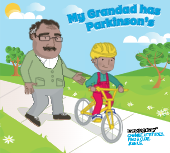
Video – Hot Chocolate with Marshmallow: A Heartwarming Story About Alzheimer’s
Hot Chocolate with Marshmallow is an animated video from Understanding Alzheimer’s for Kids, designed to help children understand Alzheimer’s disease in a gentle and relatable way. The story follows Johnny and his Grandpa Dan, who are best friends and share a special Sunday tradition of playing, reading, and enjoying hot chocolate together. As Grandpa Dan begins to forget things—first small details, then more important moments—Johnny starts to wonder if his grandpa will forget him too.
This touching animation explores memory loss, love, and ways children can support a loved one with Alzheimer’s, providing reassurance and practical ways to stay connected. A valuable resource for families, caregivers, and educators looking to explain dementia to children with empathy and understanding.
Video – What Is Alzheimer’s Disease? | The Dr Binocs Show | Peekaboo Kidz
This fun and educational video from The Dr Binocs Show explains Alzheimer’s disease in a simple and engaging way for children. Dr Binocs breaks down how Alzheimer’s affects the brain, leading to memory loss, confusion, difficulty with self-care, and personality changes. The video also discusses common symptoms, why forgetfulness happens, and how families can support a loved one with Alzheimer’s.
Perfect for kids, parents, and educators, this science-based video helps young viewers understand brain disorders in a clear and approachable way. A great resource for learning about neurological health and caregiving for the elderly in an age-appropriate format.



